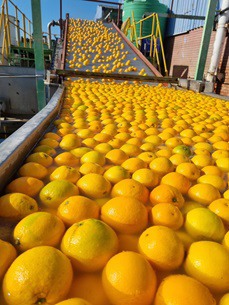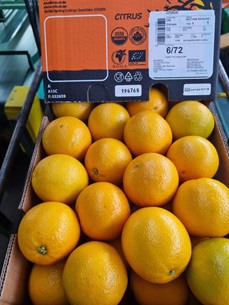 This has been the second season of sending out South African oranges under Europe's cold steri protocol, and the chill damage on organic oranges on arrival can be estimated at between 5% and 20%, reckons Paul Marais, organic citrus farmer and chair of SOGA, representing a group of four organic farmers in the Sundays River Valley.
This has been the second season of sending out South African oranges under Europe's cold steri protocol, and the chill damage on organic oranges on arrival can be estimated at between 5% and 20%, reckons Paul Marais, organic citrus farmer and chair of SOGA, representing a group of four organic farmers in the Sundays River Valley.
The protocol came into effect in 2022 in order to, according to the European Commission, safeguard European citrus growers against the African false codling moth, a quarantine pest, commonly referred to as FCM.
Still, Marais notes, similar amounts of organic oranges continue to be sent to Europe because consumers are looking for fruit with lower residues, but it's an unedifying exercise.
"Not having access to the heavy waxes and fungicides used on conventional fruit, we have quite a bit of chill damage when the fruit arrives, which is," he maintains, "an unnecessary destruction of value."
The protocol adds enormous expense to the whole process – at least five days in forced steri chambers lowering the temperature to 2°C before it may be loaded out, plus shipping for 24 days at the same temperature. The additional costs make organic fruit more expensive to buy while farmers earn less from selling it.
Organically approved wax not a silver bullet Years ago already the Sundays River Citrus Company developed and registered a carnauba wax for use on organic oranges, protecting against cold damage and reducing moisture loss, and it has been instrumental in allowing organic exports to continue despite the steri protocol.
Years ago already the Sundays River Citrus Company developed and registered a carnauba wax for use on organic oranges, protecting against cold damage and reducing moisture loss, and it has been instrumental in allowing organic exports to continue despite the steri protocol.
Marais cautions that it's not a silver bullet, with no guarantee of full protection and they still encounter chill damage on arrival. Elsewhere in the country, some organic citrus growers have given up on organic farming because of the amount of oranges they lost during shipping.
"Cold damage varies on logistics: if it takes four or five weeks it's ok, but with logistics not being ideal, you can find your fruit travelling for six to eight weeks. Organic oranges should ideally be travelling at 7°C to 10°C, now it's going at 2°C and you can imagine the damage."
Damaged fruit are discarded (at cost to the grower), compounding the food waste problem.
No FCM ever on organic fruit
"Everyone's talking about sustainable farming – we're doing it already and we're an incredibly low risk but that's being ignored at this stage," he says. "The false codling moth pest is under complete and 100% biological control in our orchards. We have never had an FCM interception. Ever."
Apart from biological control through viruses and the longstanding Xsit programme releasing sterilised false codling moth males over South African citrus orchards, the biggest protective factor in an organic orchard is its soil where over 90% of FCM larvae are predated on and never complete their life cycle.
The citrus industry has called for a dispensation for organic oranges on the scientific grounds that organic fruit poses no risk he says, with a safe shipping regime of 4°C to 7°C but, he remarks, the request to cut organic farmers some slack has thus far fallen on deaf ears.

Over 90% predation on false codling moth larvae in the healthy biodiverse soils of South African organic orchards For more information:
For more information:
Paul Marais
SOGA
Tel: +27 42 230 1376 / +27 87 702 9112
Email: [email protected]
https://sogaorganic.co.za/
